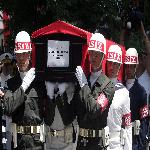July 27, 2011

Photo: ASSOCIATED PRESS
Soldiers carry the flag-covered coffin of one of 13 Turkish soldiers killed southeastern Turkey by Kurdish rebels July 16, 2011.
In the last two weeks, 20 Turkish soldiers have been killed by the Kurdish rebel group, the PKK. The more than quarter-of-a-century conflict between the group and the Turkish government has erupted again, as hopes for a political solution in Turkey falter. The renewed hostilities are threatening for the first time to spread into an inter-ethnic conflict.
At Istanbul's prestigious international jazz festival, Kurdish singer Aynur Dogan is heckled off the stage by the audience. She was singing in Kurdish just days after the killing of 13 soldiers by the PKK, an intolerable provocation to some of the concert-goers.
After Dogan was forced off, some audience members started to sing the Turkish national anthem. The incident set off alarm bells across the country.
"This is presumably culturally the most sophisticated part of the Turkish public -- at a jazz concert. They knew somebody was going to sing in Kurdish and they can't tolerate it. That shows how raw the wounds are. And it's just not for Turks. I think it's for the Kurds as well," said. Soli Ozel, a political columnist for the Turkish daily Haberturk. He says the incident, which made front page news across Turkey, is an indication of a polarization between Turks and Kurds.
Even at the height of the conflict between the PKK and the Turkish state in the 1990's, hostilities rarely threatened to spill over into an inter-ethnic confrontation. But during that time, millions of Kurds fled the war-torn southeast and have since been living side-by-side with Turks.
Ozel says the governing AKP Party now faces a dangerous situation. "On one hand, the AKP manages to integrate the Kurds into the economic system so they have more of a presence, and this creates resentment on the parts of Turks who already have a position in the economic system. On the other, as the Kurds get more educated and more populated in the western and southern cities, they are also expressing their anger more forcefully," Ozel said.
That combustible mixture exploded into violence in a poor suburb of Istanbul in early July. The area, called Zeytinburnu, has a large Kurdish population -- mostly migrants who came here in the 1990's. A small protest by Kurdish youths resulted in thousands of Turks taking to the streets and attacking anyone they thought was Kurdish.
"I am Turkish, I am Turkish" a petrified man shouts as he is surrounded by the mob, many wielding wooden clubs.
They were angry at the mounting death toll of Turkish soldiers at the hands of the PKK, and many -- like this woman -- now direct that anger at all Kurds.
We want a solution to be found, she says. She says she does not understand why they cannot get rid of all these Kurdish terrorists and their Kurdish supporters. Wipe them all out, she says.
Ertugral Kurkcu, a member of parliament with the pro-Kurdish BDP party, says he is mostly worried about the millions of young Kurds now coming of age whose families were left traumatized and destitute by the fighting in the 1990's.
"Their enmity to the present state practices are even wilder than the former generation. They're not unreasonably enraged. This is a very savage climate they are living in. Not only the physical conditions, (but) the spiritual conditions with no respect from both the government and society," Kurkcu said.
Despite the rising tensions and the intensification of fighting between the PKK and the government, an escalation into wider inter-communal violence is seen by analysts as some way off. That, in part, may be due to the realization on both sides that such violence would be extremely hard to stop once it starts, and would have profound repercussions for the country for generations to come.